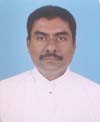Rev.Dr. Jebaratnam Jebamohan completed his PhD in September 2006 under NCAS grants scheme at the University of Jaffna, Sri Lanka. His research was mainly identifying the relevance of the Islamic Philosophy and Theology for the Sri Lankan Christians and Muslims to work and witness together for a common liberative mission of the poor in promoting unity, peace and harmony in Sri Lanka. He has made an attempt to revise and formulate the Islamic socio-economic Philosophy and Theology relevant to present Sri Lanka. He dealt extensively with the doctrine of Capitalism, Socialism and Communism as these human-made systems are the most powerful of all the contemporary social doctrines in Sri Lanka. He reviewed each theory separately, concluding with a criticism of the misconceptions of each system listing its pros and cons on the basis of its practical operation. This study of contemporary presentations of the Islamic socio-economic justice philosophically and theologically and the rethinking approach of Islam, helps to have Inter-religious dialogue with other religions, has a special importance to the present Sri Lanka.
Research Abstract of PhD
The relevance of the Islamic Philosophy and Theology for the mission in Sri Lanka
At present, two major secular Philosophies such as the Western system of Capitalism and Communist system of Socialism are contending for supremacy in Sri Lanka. The researcher believes that these two major secular Philosophies are openly ravaging each other in the present civilian Government and in the Christian churches. Many Sri Lankans are directly or indirectly supporting one or the other which has brought socioeconomic exploitation among the people and a state of chaos in his country as a whole
Keeping this in mind, the researcher considers Capitalism as thesis. Communism which has come out of Capitalism as anti-thesis and the religion of Islam which teaches the golden means has provided the much needed to the society as synthesis of the two extreme socio-economic systems. In this sense, this dissertation is a survey of two major human-made contemporary secular socio-economic doctrines as compared with Islamic view and thus aims at the removal of the doubt and prevailing fancies which have taken hold of some masses due to ignorance of Islam and the application of its socio-economic Philosophy and Theology. The researcher shall try to give detail assessment-of-these doctrines and he shall conclude that Islam takes no sides with a group against another. It directs each class of community to the proper way by which secures good for itself and for the community as a whole.
In this way, the purpose of study is to explore the possibilities of formulating the Islamic socio-economic Philosophy and Theology relevant and acceptable by all community in this country, especially by Christians to promote a common liberative mission in the present Sri Lanka to liberative the masses from the socio-economic exploitation of the Western system of Capitalism and the Communist system of Socialism. Along with this, one of the major objectives of this investigation is to explore the possibilities of reformulating the Islamic Philosophy and Theology in the predominantly Sri Lankan context. Secondly, it is to discover how ordinary Sri Lankans are involved in creative Philosophy and Theology using illustrative and analogous concepts to describe their understanding of the Islamic concept of socio-economic justice. In the light of the above objectives, another aim is to contextualize the religion of Islam Philosophically and Theologically to the present Sri Lankan society. The ultimate task of the study is to present as coherently and impartially as possible Sri Lankan response to the present context, the relevance of the Islamic Philosophy and Theology that is liberating and dynamic.
By his research, the researcher finds that the religion of Islam has a vibrant liberating and dynamic Philosophy and Theology of the socio-economic system based on freedom, justice, equality and the brotherhood and sisterhood that is relevant and acceptable by all community in the present Sri Lanka. To liberate the masses from the socio-economic exploitation in the present Sri Lankan context, the researcher finds that no pressure. terrorism or thefts must be used but it must be based on reasoning and the people must be convinced that these principles ensure true happiness in this world and the blessings of Allah in the Hereafter. The researcher also finds that the Philosophy and Theology of the socio-economic doctrine of Islam teaches us that natural human society — that which conforms to the natural ethical and social laws — is that society which is built upon the principle of the absolute sovereignty of God. The point of this teaching is that authority, the basis of order and stability in society, can only proceed from an incontestable and uncontested source, of the nature of the moral supremacy of God Himself. In the light of the above findings, the researcher with his deep appreciation and conviction confirms that the Christians can join hands with the Muslims to prepare the Sri Lankans ethically for onerous and redeeming tasks set to them and to promote a common mission in the present Sri Lanka to liberate the masses from the socio-economic exploitation of the Western system of Capitalism and the Communist system of Socialism.
